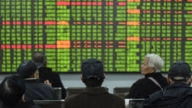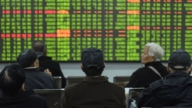【新唐人2013年09月11日讯】根据美国《华尔街日报》报导,中国信贷扩张速度已超过2008年美国金融危机前的水准,曾在金融危机作空大捞一笔的投资人开始将空头目标锁定中国,押注美式金融危机可能在中国重现。而全球最大空头基金公司尼克斯联合基金总裁吉姆•查诺斯日前也大胆的作出预言。他说,“中国金融危机势必发生,只是或早或晚的区别。”一些经济学家们则表示,中国债务的快速上升是导致未来危机的决定性因素。
根据国际清算银行(BIS)数据,中国企业与家庭信贷快速攀升,从2008年占国内生产总值(GDP)120%左右,到目前超过170%,这些资料还不包括金融企业债务在内。
相较于美国金融危机前信贷激增期间,该比率从2001年的143%,升高至2008年的177%,日本则是在1989年之前10年历经类似信贷扩张。
瑞士银行(UBS)资深经济顾问马格诺斯(George Magnus)表示,类似美国房市泡沫化过程,中国透过无节制的信用扩张来刺激经济,而非寻求更好的经济成长动力,导致收入差距扩大,这些都是一国处于金融动荡相对严重阶段的预警迹象。
北京天则经济研究所副所长冯兴元:“美国的联邦制的特点就是,任何一个职位,任何一个机构它没有绝对的权力,中国的话,基本上是行政部门他想做什么,我们的人大基本上是确认或者事后确认或者是根本也不需要确认的这样一种关系。”
中共总理李克强9号在英国《金融时报》发表文章,他强调中国已经不可能沿袭高消耗、高投入的老旧模式,而是必须统筹“稳增长、调结构、促改革”。
冯兴元:“中国要解决问题,没有别的出路,只有民营化一条路,但是他们的国企的改革,国有银行的改革会有很大的阻力。”
瑞士银行资深独立经济顾问马格诺斯(George Magnus)表示,中国经济当前状况与美国当年的相同之处在于,都是通过(巨额信贷投放的方式来刺激经济,而不是去寻求更好的经济增长动力,并且收入差距日益扩大。马格诺斯还表示,在中国,由于政府控制经济,且中国决策者们已经目睹了美国经济泡沫的破灭,中共当局将能够以西方国家无法动用的办法来应对,但这并不意味着不会造成任何负面冲击。
《新唐人》特约经济评论专家杰森:“中国的经济它不是一个正常的GDP,它不是有自身的一个运作机制的生命体,它本身实际上是中国(共)政府严格控制的一个政治衍生物。”
有网友说,数据修饰、印钞机、专政,造就中国不会出现发达资本国家金融危机,如果出现危机必将是由于在调控过程中政府有意为之或力不从心!
根据中共央行网站公布的资料显示,近10年来中国货币供应量不断增加。从1999年人民币广义货币供应量的11.76万亿,到2012年10月底的93.64万亿元。外界认为,货币就像水一样流出来,必然带来灾难。
杰森:“它(中共)知道这个泡沫,知道这个定时炸弹,但是它希望用拖延时间的办法,想要找一个要嘛叫软着陆,要嘛叫做缓和的方法,让它可控的爆破,可控的崩塌,这是它们的想法,但是能不能做到?这点就是一个巨大的问号。”
全球最大空头基金公司尼克斯联合基金总裁吉姆•查诺斯,今年七月接受CNBC采访时表示,中国的信贷泡沫是世界层面的,而且将变得越发糟糕。
采访/陈汉 编辑/黄亿美 后制/郭敬
China Credit Levels Overtakes USA
The Wall Street Journal (WSJ) reported
that China’s credit has risen quickly.
It has exceeded US credit levels before its crisis in 2008.
Currently, investors, who have made a fortune during
the crisis, are now moving their target to China.
Investors have made billions betting against US
economies and are likely do the same on China.
James Chanos, an US hedge fund manager
and founder of Kynikos Associations recently
explained that China’s financial crisis seems
to have started sooner rather than later.
Some economists said that China’s rapid rising
debt is a decisive factor leading to future crises.
WSJ reported on data from the Bank
for International Settlements data.
China’s corporate and household credit has risen
quickly, from around 120% of gross domestic
product in 2008, to more than 170% today.
This does not include debts owed by financial companies.
In it’s credit boom, the US rose from
143% in 2001, to 177% in 2008.
Japan had a similar run in the decade before 1989.
George Magnus, a senior independent economic
adviser to Swiss Bank UBS, commented.
The similarities to the U.S. are a wanton use of the credit
system to substitute for better sources of economic growth.
This is with a background of rising income inequality.
These are all telltale signs of a country at a
relatively advanced stage of financial instability.
Feng Xingyuan, deputy director at
Unirule Institute of Economics, Beijing:
“In the US, there is no absolute
power for any position or any agent.
In China, basically, the administration does what they like.
The People’s Congress’s duty is only to confirm,
subsequently confirming or not confirming."
On September 9, Premier Li Keqiang
published an article in the UK’s Financial Times.
Li stressed that China can no longer afford to continue
with an old model of high consumption and high investment.
Instead, China must take a holistic approach in pursuing
steady growth, structural readjustment and further reforms.
Feng Xingyuan: “There is no other
way for China to solve the problem.
Privatization is the only way.
However, the implementation of reform on state-owned
businesses and banks can encounter large obstacles."
WSJ cited George Magnus.
In China, the central regime controls the economy
and policy makers witnessed the US go bust.
Beijing will be able to respond in ways
that the West weren’t capable of doing.
But it doesn’t mean it won’t be painless.
Jie Sen, NTD special economic commentator:
“Chinas GDP is abnormal. It is not
calculated from a natural operation system.
It actually was a political derivative, and
strictly manipulated by the Chinese regime."
Netizens said that data modification, bank note
printing machines, and dictatorship will mean
that China won’t appear to face similar financial
crises, as happened in advanced countries.
If there is a crisis, it will be the government’s intention,
during the process of adjustment or due to lack of power.
China’s Central Bank data shows that over the past
10 years, China’s expanding money supply increased
from 11.7 trillion Yuan in 1999, to 93.64 in October 2012.
Outsiders believe that if money runs like
water, it will inevitably bring disasters.
Jie Sen: “The CCP knows about bubble
issues and knows it will burst in any minute.
However, the CCP hopes to use the way of
delaying time, so as to find a soft landing.
Or it will try to use a gentle way, and
let the bubbles burst within its control.
This is likely their idea.
Can they find the way?
This is a big question."
James Chanos was interviewed in July by CNBC.
He said that the credit bubble in China is “world-class"
and is getting “worse and worse and worse."


























